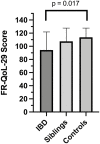Food-Related Quality of Life in Children and Adolescents With Crohn's Disease
- PMID: 35166341
- PMCID: PMC9713495
- DOI: 10.1093/ibd/izac010
Food-Related Quality of Life in Children and Adolescents With Crohn's Disease
Abstract
Background: Food-related quality of life (FRQoL) encompasses the psychosocial elements of eating and drinking. The FRQoL of children and adolescents with inflammatory bowel disease has not yet been assessed. This study aimed to evaluate the utility of the validated FR-Qol-29 instrument in children with Crohn's disease (CD).
Methods: Children diagnosed with CD, a shared home environment healthy sibling, and healthy control subjects 6 to 17 years of age were recruited to this single-center, prospective, cross-sectional study. Children or their parent or guardian completed the FR-QoL-29 instrument. Internal consistency was assessed by completing Cronbach's α. Construct validity was established by correlating the CD FR-QoL-29 sum scores with the Physician Global Assessment and Pediatric Crohn Disease Activity Index scores. The discriminant validity was analyzed using a 1-way analysis of variance, and a Spearman's correlation coefficient test was completed to identify any correlations associated with FRQoL.
Results: Sixty children or their parent or guardian completed the FR-QoL-29 instrument (10 children in each subgroup). The internal consistency was excellent (Cronbach's α = 0.938). The mean FR-QoL-29 sum scores were 94.3 ± 27.6 for CD, 107.6 ± 20 for siblings, and 113.7 ± 13.8 for control subjects (P = .005). Those with higher disease activity had worse FRQoL (Physician Global Assessment P = .021 and Pediatric Crohn Disease Activity Index P = .004). Inflammatory bowel disease FR-QoL-29 sum scores correlated with weight (P = .027), height (P = .035), body mass index (P = .023), and age (P = .015).
Conclusions: FRQoL is impaired in children with CD. Healthy siblings also have poorer FRQoL than control subjects. Several clinical factors are associated with poorer FRQoL in children with CD including age and level of nutritional risk (weight, height, and body mass index). Further research is required validate these findings and to develop strategies for the prevention or treatment of impaired FRQoL in children with CD.
Plain language summary
Food-related quality of life is impaired in children with Crohn’s disease compared with their healthy, shared environment sibling and healthy control subjects. Several clinical factors are associated with poorer food-related quality of life in children with Crohn’s disease including age and nutritional risk (weight, height, and body mass index).
© 2022 Crohn’s & Colitis Foundation. Published by Oxford University Press on behalf of Crohn’s & Colitis Foundation.
Figures

References
-
- Lemberg DA, Day AS.. Crohn’s disease and colitis in children: an update for 2014. J Paediatr Child Health. 2015;51:266–270. - PubMed
-
- Ng SC, Shi HY, Hamidi FE, et al. Worldwide incidence and prevalence of inflammatory bowel disease in the 21st century: a systematic review of population-based studies. Lancet. 2017:2769–2778. - PubMed
-
- Kleinman R, Baldassano RN, Caplan A, et al. Nutrition support for pediatric patients with inflammatory bowel disease: a clinical report of the North American Society for Pediatric Gastroenterology, Hepatology and Nutrition. J Pediatr Gastroenterol Nutr. 2004;39:15–27. - PubMed
Publication types
MeSH terms
LinkOut - more resources
Full Text Sources
Medical

